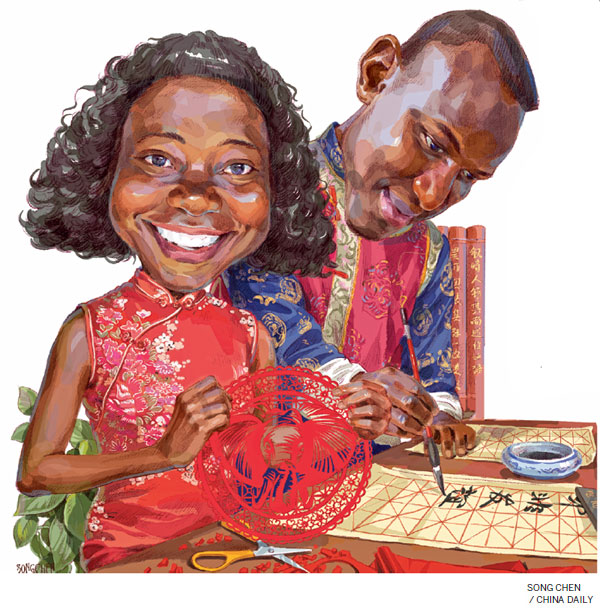Cultural exchanges boost China-Africa ties
Two-way relations will further strengthen as China's economic transformation continues
China-African cultural exchanges have been dynamic thanks to multilevel initiatives taken by both sides with the solid backing of their governments.
China is Africa's largest trading partner. According to Ernst&Young Attractiveness Program Africa 2019, China's foreign direct investment in Africa from 2014 to 2018 was $72.2 billion, more than double the $34.1 billion invested by France, the second-largest source of FDI in Africa.
Enhanced and continuous people-to-people contacts are central to making giant strides in the fields of trade, investment, technology and education. The dynamic trade ties between Africa and China, too, are supported by strong people-to-people exchanges.

Chinese and African leaders have exchanged frequent high-level visits and held countless dialogues, the latest being Chinese Vice-Premier Sun Chunlan's visit to Ghana, Madagascar and Namibia in November. The high-level visits signal commitment at the highest level to deepen trust between people on the two sides.
In 2006, the Chinese Ministry of Culture initiated an Africa cultural visitors' program to provide a platform for direct exchanges between Chinese and African peoples. In 2012, the ministry launched a cultural cooperation partnership program under the Forum on China-Africa Cooperation (FOCAC), which has since been institutionalized, helping Chinese and African NGOs to work on people-related projects.
A slew of China-Africa friendship associations, recognized by both sides, have been promoting networking and dialogue between the Chinese and African peoples, especially in African countries. A meeting of leaders of these associations was held on the sidelines of the 2018 FOCAC Summit in Beijing, indicating the commitment by both sides to strengthen ties.
People-to-people exchanges have also taken place in the fields of music, drama, theater and poetry. The China Oriental Song and Dance Ensemble, National Ballet of China, and various acrobatic groups have performed in Africa, while dance troupes from different African countries have performed to large audiences at some of China's biggest art festivals including the Meet in Beijing Arts Festival and Shanghai International Arts Festival.
China's cultural engagement is not limited to the Africa continent, but extends to individual African countries. For instance, South Africa has organized "Year of China "events and China has held "Year of South Africa" events. Also, Uganda organized Dragon Boat races in 2017 and 2018. The biggest indicator of mutual cultural respect is the launching of China's first overseas cultural center in Africa.
Last year, China-based Shinework Pictures and Perception Management International of Ghana announced the first movie coproduction to tell how Africa and China worked together to control the 2014 Ebola outbreak in Africa.
Both Chinese and African media teams benefit from the China-Africa Press Exchange Centre programs and capacity building seminars. Star Times, a Chinese pay TV operator in Africa, dubs Chinese dramas in local African languages such as Swahili before telecasting them.
In China, many African students have contested in reality shows and competitions and attended special events organized to showcase Africa to Chinese audiences. The Africa Speech Contest, an initiative by Appreciate Africa Network, is one of the many media events held every year to showcase African cultures in China. No weekend passes without an event being organized by African students or startups to tell Africa's story to the Chinese people. In fact, African students and youths in China conceptualized events such as the Annual Africa Dialogue and Beijing Africa Week, helping improve Africa's image among the Chinese people. According to a 2018 Ministry of Education report, 81,563 African students were studying in China that year, compared with just 2,000 in 2003.
And thanks to the growing number of Confucius Institutes in Africa, 48 in 2018 according to Development Re-imagined, Africans today have a better understanding of China.
China is the second most popular destination for African students after France, which has about 95,000 African students. The general perception is that Africans students are attracted to China because of scholarships, but the report shows that out of the 492,185 international students in China, 429,144, or 87.17 percent of the total, were paying for their education, and only 63,041, were on a scholarship.
Moreover, by teaching African languages, Beijing Foreign Studies University and Zhejiang Normal University are also promoting Sino-African cultural exchanges and deepening trust between the two sides. And African and Chinese scholars' collaboration in research in different disciplines is expanding the space for Sino-African cultural exchanges.
Although Africa-China have their problems, I believe the relationship still has huge potential to grow, as China's economic transformation is an ongoing process.
The author is a PhD candidate at the University of International Business and Economics. The author contributed this article to China Watch, a think tank powered by China Daily. The views do not necessarily reflect those of China Daily.
(China Daily Global 11/29/2019 page13)


















